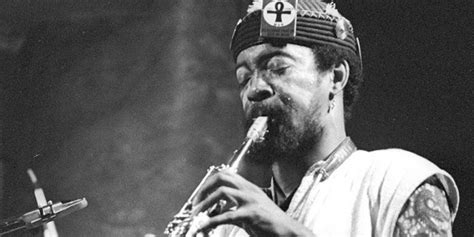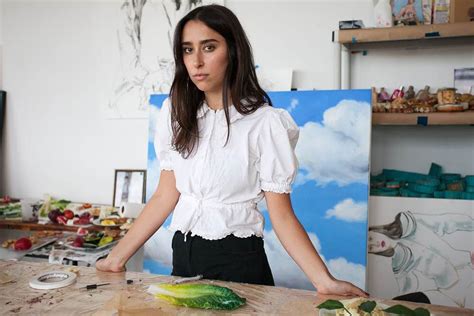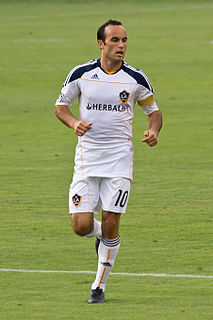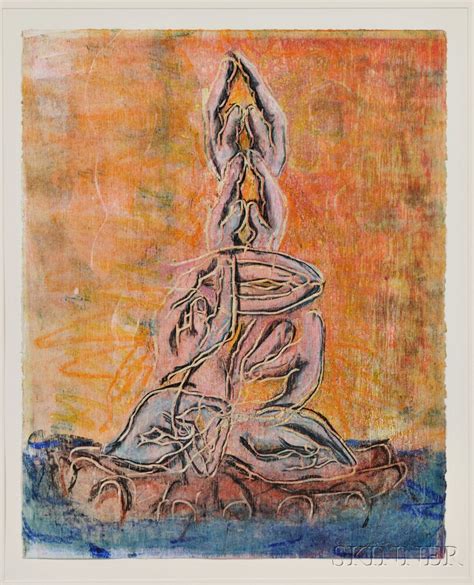A Quote by Joseph Jarman
But back to your question, it was a wonderful experience with the Art Ensemble, and I keep in contact and sort of follow what's going on, but it was also very important to make this step, you may say this leap of faith.
Related Quotes
That's what I like about the idea of the aesthetic experience, the idea of both enjoying looking at works of art and how they kind of talk to you, and also the process of making art, getting back to that idea of the aesthetic experience of making art is very important, It's another way of thinking. Instead of just using your brain, you're using your hands to think with. They're different connections, the brain that comes through the fingertips as opposed that comes through the eyes and ears.
Everyone's path is completely different. I could give an aspiring artist my timeline and every phone number and contact person along the way, but their experience would be carved out in a different way. It's the diligence to keep going in the face of obstacles that is your best ally. It's also important to know why you are doing this... attention, money, or because you got something to say, or at least in what order those things matter.
In spite of my great admiration for individual splendid talents I do not accept the star system. Collective creative effort is the root of our kind of art. That requires ensemble acting and whoever mars that ensemble is committing a crime not only against his comrades but also against the very art of which he is the servant.
It's pretentious to say, but my art is like a little Zen story, a story with a question mark at the end. People can take from it what they need. If somebody says, "Your art is very funny," I say, "You are totally right." If somebody says, "Your art is very sad," I say, "You are totally right." In Japan they say, "Your art is very Japanese, you even look Japanese.Your great-grandfather was most surely a Japanese man." And I say, "You are totally right."
I was born in Quebec City, I've lived there many years before moving to Montreal and then Ottawa. And I mean, Quebec City is a very, you know, closed city if I may say. So it's not easy to be accepted living in Quebec City. So if you're from a different faith, you may be a bit timid in showing your faith. So I mean, you're already from a different country, you're an immigrant and hearing what you hear about Islam, you might not wish to be identified as a Muslim, and you may be very discreet into your faith and going to the mosque.
I think art is beautiful. It's decoration and adornment. But art is also a really important vessel for social change, and social change begins with thought. And so if you can find humor in something and take a moment to rethink it, you can take a step back and look at your values from a different angle. I think that's a really important way of carrying on with life. I think the best art for me is funny and the best comedy for me is art. Some of my favorite artists are comedians. Comedy is art, and art can be comedy, and the intersection is vital - at least for my own work.
That's a part that's always a challenge for athletes: trying to keep the passion alive while knowing it's still your job. There's no question that at some point, probably sooner rather than later, I'll be pretty burned out. And when that time comes, then I'll take a step back and take a look at it and see if I want to keep going.
Shareholders are sort of like cats; they get herded around, and they follow the leader. With the exception of a few activist shareholders, there are a very rare number of big, important, influential shareholders that like to step up and say there's a problem here, especially when they're making money.
A very tall man once asked a question after my talk. Before beginning his question, he explained that the reason he was standing up is not to be intimidating but rather to make eye contact. His question was essentially "are we really interested in moral motives? Isn't it all about action?". I pointed out to him that it was not enough for him to do the right thing - stand up - but he also wanted me to know that he is doing it from the right motive or for the right reason - to make eye contact, rather than to be intimidating. Voila, moral psychology.




































